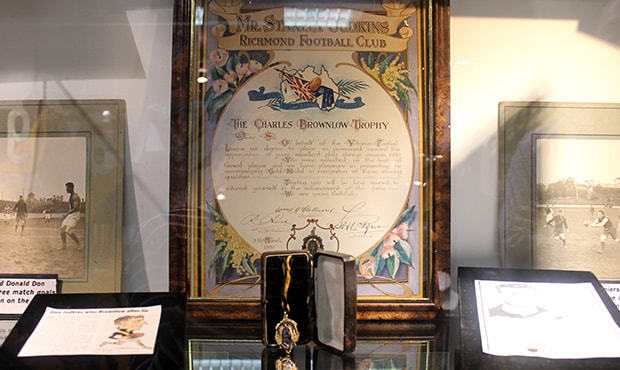The 1930 Brownlow Medal won by classy Richmond wingman Stan Judkins now takes pride of place in the Tigers’ museum at Punt Road, courtesy of a group of key Club coterie members.
They raised the required funds to enable the Club to purchase the first Brownlow Medal ever won by a Richmond player.
This truly is a precious piece of Tigerland memorabilia . . .
Stan Judkins is one of only four Brownlow Medallists in Richmond’s proud history (Bill Morris in 1948, Roy Wright in 1952 and 1954, and Ian Stewart in 1971 being the others).
Apart from being the Tigers’ inaugural winner of the Brownlow Medal, Judkins holds several other league football records as the winner of the game’s most prestigious individual award.
At just 166cm and 61kg, Judkins is the smallest and lightest Brownlow Medallist.
The four votes Judkins polled to take out the 1930 Medal is the lowest-ever winning total in the Brownlow’s history.
And, to this day, Judkins remains the only Brownlow Medallist to have been dropped to the reserves in the same year he won the Medal.
Incredible as it may seem today, Judkins spent the last five rounds of the 1930 home-and-away season in the seconds at Richmond following a major form slump.
Stan Judkins was recruited to Richmond from VFA club Northcote and quickly became a senior regular in his 1928 debut season at age 20.
That year, the diminutive wingman starred in the Tigers’ semi-final victory over Carlton, but he was relatively quiet three weeks later in the team’s Grand Final loss to Collingwood.
Judkins missed Richmond’s 1929 finals campaign because of injury, but he started the 1930 season in brilliant touch.
With his lightning pace, fine ball-handling skills, slick disposal and clever evasive ability, Judkins set the Tigers alight during the first half of that season.
But, as the year wore on, Judkins’ form dropped right away and, in the last month of the season, he found himself battling away in the seconds, trying to regain his place in the senior side, oblivious to the fact that he was about to create league football history . . .
The Brownlow Medal for the Fairest and Best player in the then VFL competition had been introduced in 1924, and the original voting system saw the field umpire award one vote per game to the player deemed best-on-ground.
Back then, of course, there was no fuss or fanfare surrounding the Brownlow Medal count. A gala Brownlow presentation dinner was still decades away.
After the final home-and-away round of the 1930 season, the votes were tallied and Judkins, who polled four votes, had tied with Collingwood’s Harold Collier and Footscray’s Albert Hopkins.
Two nights after the count, the VFL umpires’ board, which administered the award, recommended that no Brownlow Medal be awarded that year because there was no provision for a tied result.
A week later, however, Judkins was at home when his father showed him a newspaper article stating that he had won the Brownlow. Judkins was subsequently notified by the VFL to come and collect his award . . .
The VFL administration of the day had over-ruled the umpires’ board and decided, in the event of a Brownlow tie, the medal should be awarded to the player who had played the least number of games in that season.

Because Judkins had played 12 games, compared to Hopkins 15, and Collier 18, he became the 1930 Brownlow Medallist.
In effect, Judkins’ omission from Richmond’s senior side, into the seconds for several weeks, enabled him to win the Brownlow!
Interestingly, 1930 was to be the last year of the Brownlow Medal’s one-vote per game system, with the VFL adopting the 3-2-1 voting system in 1931.
Judkins went on to figure prominently in the 1931 and 1932 Brownlow counts, finishing equal fifth on both occasions.
He formed part of a famous Richmond centreline, with Alan Geddes and Eric Zschech, and was a valuable member of the Tigers’ 1932 and 1934 premiership sides.
Many years later, Judkins’ son, Noel, played for Richmond’s under 19s, and subsequently became the Club’s Football Manager, before embarking on a successful career as Recruiting Manager at both Essendon and Collingwood.
Museum staff and volunteers are continually sourcing items that represent the history of the Richmond Football Club and are extremely appreciative of any donations that members and supporters make to the museum.
The Museum is open to the public, free of charge, Monday to Wednesday 10am to 3pm and two hours prior Richmond MCG Home games.


